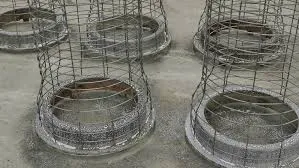Lap . 06, 2024 18:15 Back to list
grey iron
The Importance of Grey Iron in Modern Industry
Grey iron, a type of cast iron, has been a fundamental material in various industries due to its exceptional properties and versatility. Characterized by its graphitic microstructure, grey iron is known for its excellent castability, wear resistance, and vibration-damping capabilities. These traits make it an ideal choice for a wide range of applications, from automotive to construction.
One of the most significant advantages of grey iron is its ability to absorb vibrations. This makes it particularly suitable for manufacturing components such as engine blocks and machine bases, which must withstand considerable operational stress without compromising their structural integrity. The graphitic structure not only enhances its mechanical properties but also imparts a unique ability to dampen noise and vibrations, which is crucial in automotive and machinery applications where comfort and performance are paramount.
Additionally, grey iron exhibits good corrosion resistance, especially when alloyed with certain elements
. This characteristic is vital for applications involving exposure to harsh environments, such as pipes and fittings in plumbing and sewage systems. The material's ability to resist wear and tear extends the life span of components, ultimately reducing maintenance costs and increasing efficiency for businesses that rely on heavy machinery and infrastructure.grey iron

Furthermore, grey iron's cost-effectiveness cannot be overlooked. Compared to other materials such as aluminum or steel, grey iron is typically less expensive to produce and offers comparable or superior performance in many areas. This affordability makes it an attractive option for manufacturers looking to balance quality with budget constraints. The ease of casting allows for complex shapes and forms, which can lead to reduced manufacturing time and costs, further enhancing its appeal in the production process.
Innovations in alloying and processing techniques have also expanded the applications of grey iron. Advances in recycling methods have improved the sustainability of grey iron production, allowing manufacturers to utilize scrap metal and reduce environmental impact. This aligns well with the growing focus on sustainability in industry, as companies seek to minimize their carbon footprint while maintaining high performance.
In conclusion, grey iron plays a pivotal role in modern manufacturing and engineering. Its unique properties, combined with cost-effectiveness and sustainable production methods, make it an indispensable material across various sectors. As industries continue to evolve and require more advanced materials, grey iron is likely to remain a staple due to its versatility and reliability. Whether in the automotive sector, construction, or general manufacturing, grey iron is a testament to the importance of traditional materials in a rapidly changing technological landscape.
-
Durable Centrifugally Cast Iron Water Main Pipe
NewsAug.11,2025
-
Centrifugally Cast Iron Water Main Pipes for Reliability
NewsAug.10,2025
-
High-Quality Centrifugally Cast Iron Water Main Pipes
NewsAug.09,2025
-
Durable Cast Iron Water Main Pipe & Drainage Solutions
NewsAug.08,2025
-
Buy Cast Iron Pipe: Premium Ductile Iron & Drain Solutions
NewsAug.07,2025
-
Durable Cast Iron Water Main Pipe | Buy Ductile Pipe
NewsAug.06,2025


